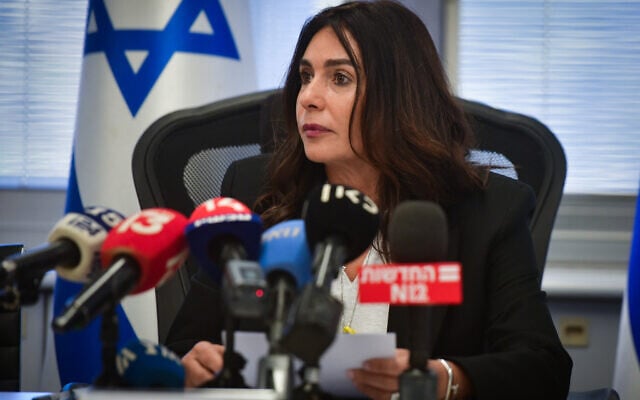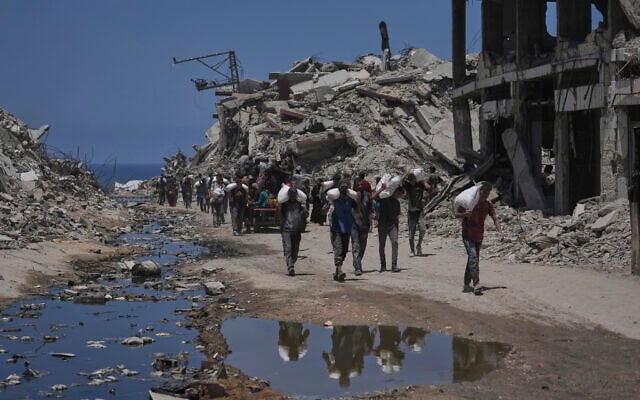



Transportation Minister Miri Regev said in a Wednesday interview that she will not support any permanent ceasefire in Gaza, and that Israel should not be “afraid” of beginning a military occupation of the Strip.
Speaking with the Ynet news site’s “120 and One” political podcast, Likud’s Regev told host Moran Azoulay that she supports the partial ceasefire and hostage release deal that is currently in negotiations, but not any deal that brings the now 21-month war against Hamas to an end.
“There will be no end to the war,” she said, arguing that “those who talk about ending the war are causing Hamas to harden its positions.”
When the host tells Regev that the hostages don’t have time to wait for more partial deals, she conceded that she is “willing to accept a 60-day ceasefire, but we won’t return to the reality of before October 7. Hamas will not remain there as an organization with operational and governmental capabilities.”
“The one preventing the deal is Hamas,” she said, adding that she is “optimistic” that a deal will soon be reached, thanks to the efforts of US President Donald Trump.
However, she said, “if a deal doesn’t happen, we need to go to the occupation of the Strip and establish a military government. We need to stop being afraid of that.”

“We need to create a pressure cooker and bring about a military government until we overthrow the Hamas regime and a population emerges there that will elect leadership and a government that wants to live in peace,” she declared.
When asked about the government’s plans to establish their controversial “humanitarian city” plan, which would see some 600,000 Gazans relocated to a cordoned-off zone built on the ruins of Rafah in southern Gaza, Regev said she is “in favor of separating the population from Hamas.”
The podcast’s host then pressed Regev on what that would mean for those Gazans that live in the new zone, especially since, under the plan, the IDF would prevent them from leaving the area once they enter.
“So it’s basically a prison?” the host asked.
“They live in a prison under Hamas today,” Regev answered.

Negotiations to reach a deal have been taking place since July 6, with the deal on the table envisioning the release of 10 living hostages and the bodies of 18 slain hostages in exchange for a yet-to-be-agreed-upon number of Palestinian security prisoners during a 60-day truce.
Once the temporary ceasefire commences, the sides will hold talks on the terms of a permanent ceasefire and the release of the remaining 22 hostages, around 10 of whom are believed to be alive.
Mediators expressed optimism last week about the chances for an imminent deal after Israel agreed to back off from demands regarding the scope of its troop presence in Gaza during the two-month truce. Since then, however, Hamas has been accused of dragging its feet in responding to the latest Israeli concessions and had yet to do so as of late Tuesday night, a source said.
The war in Gaza began with the Hamas-led October 7, 2023 invasion and massacres, during which terrorists killed some 1,200 people and kidnapped 251 hostages back to Gaza.
In the ensuing war, some 58,000 people in Gaza have been killed, according to Gaza’s Hamas-run health ministry. Hamas casualty figures cannot be verified and do not differentiate between combatants and civilians.
